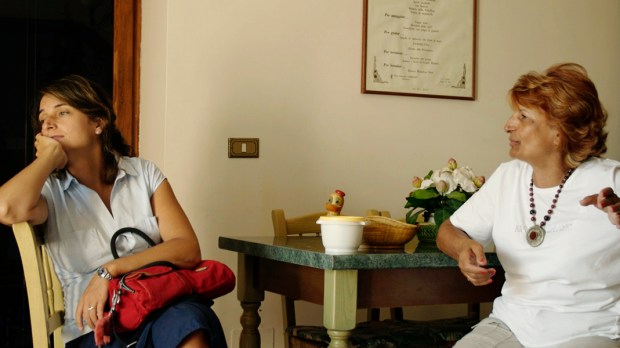Looking back, the grass is always greener on the other side of the white picket fence. You think you would have been more confident as an adult if your mother had not criticized you all the time. Perhaps you would do better at work if you had not been overly protected and excused from everything as a child. That is why you praise your children. Too much. You sign them up for swimming and horseback riding. You encourage them to sing at family celebrations, even though they get a stomach ache every time. You think that it will hurt a little, but when they grow up they’ll appreciate it. In the future, they’ll be free of insecurities and fears.
But this is also a limiting perspective built around the wrong starting point: I don’t want to be like my mother. Setting yourself up in opposition to your mom does not mean that you will not make parenting errors or that your child will have a better and easier adulthood.

Read more:
A son to his mother, a former adult film star: “I love you as you are”
Do not expect that by rebelling you will avoid all of her mistakes. Swearing that you will not go down the same path does not make sense. Many attitudes, beliefs, or behavior patterns are so ingrained in us that we often repeat the mistakes and errors of the previous generations unconsciously.
Feel free to use your childhood experience; it is a good guideline. It’s not about being different. Forcing differences will not guarantee that things will be better and smarter. It is important to be in touch with the past, however. Don’t do what didn’t serve you well, but avoid excessive zeal and hotheadedness.
Sometimes it turns out that what limited us in childhood gave us strength later. Had my mother been the perfect parent, I might have more trouble communicating with “difficult” people. Maybe my childhood would have been more successful (read: easier), but it’s the difficulties that shaped me to be who I am.
I am me. Just like my mother is herself, and my children are themselves too. Such an attitude relaxes us and brings joy and ease to motherhood. It is a tender response to what children are experiencing, instead of offering ready-made and previously decided on ideas.

Read more:
A letter to my daughter, now a mom
Your children will also have a list of grievances, regardless of how different we will be from our mothers, and how much we want to give them what we didn’t have.
We can try, but we will never be perfect mothers. There is no such thing as a perfect mother. And thank goodness, because children do not need an impeccably virtuous model but a wise, empathetic, and supportive presence.
It’s important to maintain a close bond with your mother, but one that doesn’t block your own vision of what kind of a mother you want to be.
It is useful in everyday situations when you set boundaries, and then a grandmother comes and changes them. Perhaps she allows your children to eat on the sofa while watching TV, or toss pebbles at the birds in the park, which is against your rules.
Sometimes a toddler has aggression issues and the mother wants to wait out a tantrum, and here comes Grandma, ready to console and distract. When she encounters opposition from the child’s mother, she starts telling her daughter what she should do. The conflict gets going, and Grandma offers her crown argument: “I guess I didn’t raise you all that bad if you are so smart now!”
You have to have the courage to oppose wisely. Opposing wisely means not yelling, not dredging up a painful past, and certainly not humiliating her by saying she doesn’t know.
Read more:
Lessons on Motherhood from St. Zelie Martin, Mother of Thérèse
It is important not to get into quarrels over daily events. There will always be disagreements. You can always say what you remember from your childhood and how that makes you feel. But opening up painful secrets is difficult, and it’s easier to protest that Grandma gave the child a fat pork chop while you had an organic ham and salad prepared. Those old wounds manifest themselves in everyday anger.
We rarely open up honestly to our mothers with our childhood grievances. It’s very important because we often have a tendency to criticize our mothers, but not to reveal the suffering we carry from childhood.
It’s good to talk it over once you have calmed down — and not in front of the children. First, it helps to thank your mother for helping with the kids. And then you need to set the ground rules clearly and distinguish between the role of the mother and the grandmother. Give each other space and share jurisdiction. Both sides can look at each other from a distance. Listen, look. Not as a mother and daughter, but as two women who do not automatically reject everything the other proposes and who do not react prematurely, raising their voices or withdrawing into silence.
Grandmas had their mothers, too. They have their own limitations and do not have to accompany their adult daughters in their mothering struggles. Because it really is the task of adult children to cope with their feelings, and their mothers don’t have to help in that task.
Perhaps as mothers, it would be good for us to not look back, at our childhood, but look forward, at our children. Look at them carefully and tenderly. Convey to them that the experiences of the first years of life are important. They shape us, but they do not determine who we are. If we lacked something in our childhood, then that injustice is not necessarily a wrong we need to carry with us our entire life.

Read more:
My past, O Lord, to Your mercy; my present, to Your love; my future to Your providence.
Try to be a good enough mother. One who does not destroy and limit but supports and encourages. One who reinforces independence and gives a good base for self-understanding and how not to hurt others. But be aware that mothers are not the only people in our children’s lives. They will get acquainted with the world and other people, and they will confront difficult situations on their own.
The most important thing is to be a conscious mother. Understand: you are the mother. You have the right and the duty to make your own choices for your children. Have courage!
This article was originally published in thePolish edition of Aleteia.

